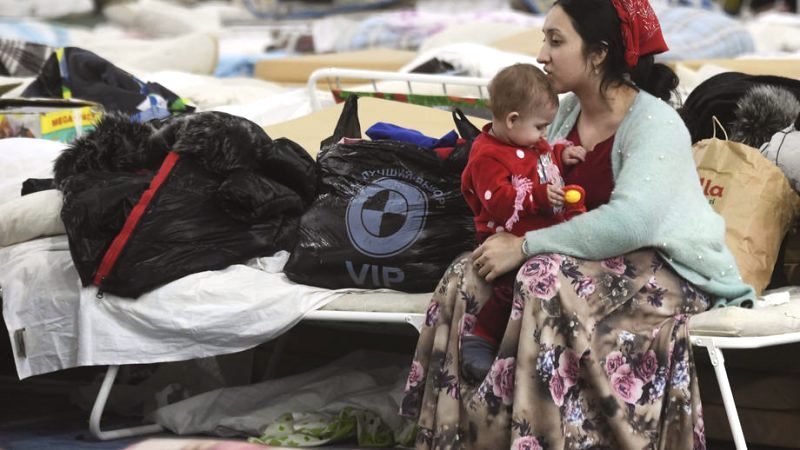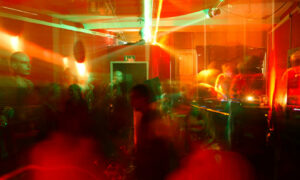(Editor’s note: This post is Pt. 3 of a continuing series documenting the work of a multi-lingual Ukrainian expat in Berlin helping newly arrived Ukrainian refugees. You can read Pt. 1 here. You can read Pt. 2 here. )
A lot of Roma-looking families are walking in all the time. No one checks if they have Ukrainian passports. In fact, no one checks anyone’s passports here, not for the people who arrive — volunteers of course are checked before they can start working. The volunteers who have been working here for some time say that many Roma people come on a regular basis — for water, food, meds. Or just to have some rest.
Perhaps they’re Ukrainian refugees, too, but no one knows for sure.
I ask one of the Roma women I am interpreting for where she’s going. She tells me that they’re waiting for a grandmother who is arriving on one of the next trains.
“Then she will decide.”
“The grandmother will decide?” I ask, surprised because I remember my own older relatives at home, as helpless as kids in Germany because everything here is strange to them. “Yes,” the young woman says as a matter of course. “She’s the eldest in the family.”
What’s next?
All the Ukrainian refugees have the same question in their eyes, sometimes unspoken. What is next?
I’ve read a report from another volunteer that took shifts in this very tent, and this is what she writes.
Everyone who has ever gone on vacation and booked accommodation wants to know: what is the accommodation like? With these guests in the “welcome hall” the question fades away to nothing. An emptiness arises in me, I struggle for an answer, because I understand: from e.g. Warsaw to Berlin the destination is clear. Then we put them on a bus, and the destination is anything but clear. A woman asks me if she and her two children are being taken to a hostel. My breath catches in my throat. What should I answer? What does collective housing mean in English? I get a colleague to help me, who knows Russian and explains the situation. Of course, collective housing is always better than having to spend the night on the street. The nothingness, the emptiness, arises from the fact that neither the refugees nor we know what will happen after the collective housing. So I send the refugees to the bus that takes them to the collective housing, but I feel like I’m sending them to nothingness. That’s exactly the job that night.
We send people to the nothingness, hoping that someone, somewhere, will find the answers that we’re unable to provide.
We don’t know who, or how.
‘The whole thing is a mess’
At the end of my shift I check out at the container outside and leave, exhausted. I can’t feel my feet, and my head is ringing with the leftovers of German phrases. I am struggling to find better expressions and repeat the new words that I had to look up in my head. I meet some other volunteers from my company, the ones who don’t speak Russian or Ukrainian and were on the food line duty, or handing out hygiene supplies.
“I think this whole thing is organized quite well”, says one of them, a German.
I am thinking of the people waiting for their health insurance for more than a month and unable to get into any medical practice; about the young woman with a bicycle fine and no way to get any money; about the man with panic attacks who couldn’t get his pills; about the two women with seven kids between them who probably are spending the night today on some foldable beds in a crowded place with no idea what comes next.
I think I couldn’t disagree more. “The whole thing is a mess.”
In the morning, I’ve brought two big packs — about 50 pieces — of HotWheels cars to the play corner. I’ve seen many HotWheels cars being requested at Berlin Hauptbahnhof, so I thought it would be a good idea to bring some to the tent as well. I know from experience that a little kid with a small car clutched in his tiny hand behaves three times calmer and throws a hundred times fewer tantrums than a kid without one. So I bring the cars, and we place them on the shelves in the play corner before I start the day.

After my shift, a volunteer from the play corner comes up to me and says that the Roma kids swiped almost all of the cars in one day. But the Roma kids are still kids, so what does it matter? I don’t begrudge them the cars; it’s not like I thought they’d stay there forever. I was pretty sure the cars would eventually join the little travellers, I just wasn’t aware that it would happen so quickly.
I guess the tent needs more tiny cars, then.
I still hope to see the day when no more cars are needed there. When the tent itself is obsolete, and so is the volunteer station inside the Hauptbahnhof.
And when the tiny travellers return home, clutching the HotWheels cars tightly in their grubby little hands.
Maryna is a software developer from Ukraine who now lives in Germany. Maryna also writes a programming blog to share her knowledge. She sometimes speaks at conferences, though being an introvert, writing comes more naturally. She says she’s not a professional writer but writing is something she likes, “and I think I can do it pretty well.”














